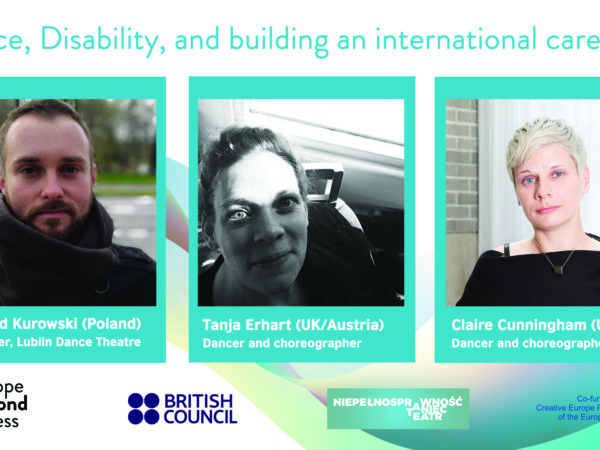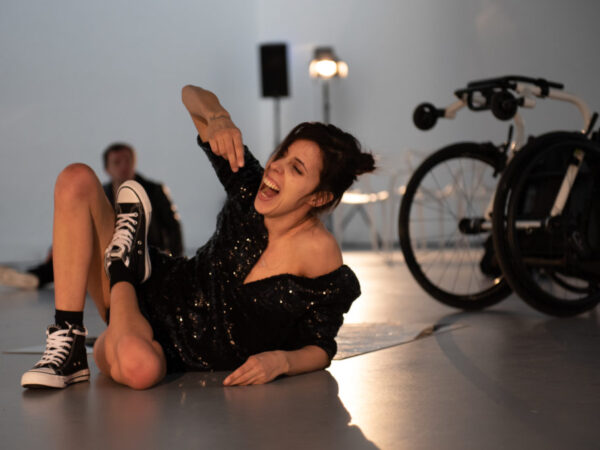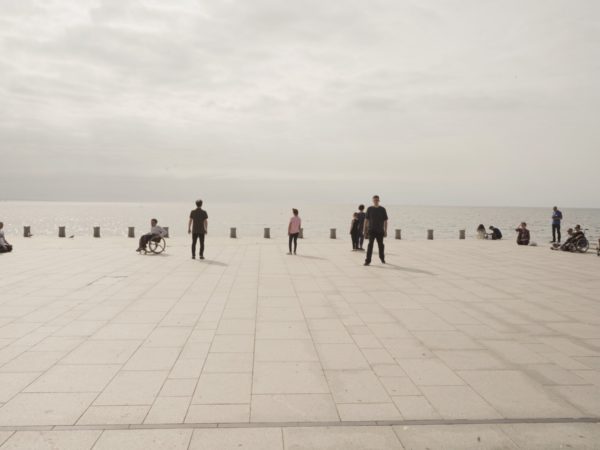Personal insight
Katarzyna Żeglicka (Poland) reflects on the dramaturgy and documentation of diverse dance
OpinionResource
February 3, 2022
Katarzyna Żeglicka is a queer disabled performer, dancer, choreographer and self-defence trainer, and one of a new generation of disabled artists who are challenging ableism in the performing arts. Katarzyna was one of the artists chosen for the fourth Europe Beyond Access artist laboratory The dramaturgy of movement transitions, which took place in Italy in September 2021 and was hosted by our project partner Oriente Occidente.
An interview with Natalija Vladisavljević
OpinionResource
April 28, 2021
Interview To Meet in Contemporary Dance, with choreographer and performer Natalija Vladisavljević, originally published in the online magazine Portal o invalidnosti, organizacije Iz kruga – Vojvodina. Translation to English by Frosina Dimovska.
Podcast: dance, disability and building an international career
ToolkitResource
How do you work towards building an international career as a dancer or choreographer? How do you develop successful connections with curators and programmers?
‘You can always find a connection’: an interview with Sonja Parmentier
OpinionResource
May 7, 2020
In the most recent DanceAble, Holland Dance Festival invited dancer, teacher and choreographer Sonja Parmentier to deliver a series of masterclasses in which she focused on finding connections between dancers.
Naked and disabled: the body as a site of strength and beauty
OpinionResource
May 5, 2020
There is a long tradition of artists and performers being drawn towards nudity as a tool of shock, vulnerability, truth and raw self-expression. It places the body in the public eye, revealing what is usually hidden, and uses explicitness and intimacy to spotlight the audience’s gaze as part of the meaning-forming process. Voyeurs, spectators, observers are not as innocently passive as once thought.
From Portugal to Poland: coming to Warsaw as an international disabled artist-in-residence
OpinionResource
April 7, 2020
The first disabled artist to receive the EU’s i-Portunus fund, Portuguese dancer Diana Bastos Niepce speaks about her experience undertaking a residency in Poland with learning disabled-led company Teatr 21. During the residency, Diana collaborated with the choreographer Justyna Wielgus, performing in her directorial debut “PokaZ” at Warsaw’s Zachęta National Gallery of Art. The piece interrogated the act of looking, what we see and what remains hidden, the limitations that stereotypes place on our identities – a challenge to the ‘socially acceptable’.
The long read: Dance and Disability in Poland
Country Profile, OpinionResource
March 24, 2020
By Alicja Müller (translated by Marta Dziurosz). Read the full version published in Polish on taniecpolska.pl
Italian artist Chiara Bersani on COVID-19 and disability
OpinionResource
March 24, 2020
Chiara Bersani is an Italian performing artist and choreographer whose work in theatre and contemporary dance explores the politics of the body and how the images we create interact with society’s narratives. In 2019, she took part in a Europe Beyond Access residency at Festival Oriente Occidente and previously participated in Aerowaves and Moving Beyond Inclusion. Here, she reflects on ableist responses to a public health emergency and how disabled bodies are framed during the Coronavirus pandemic.
Katarzyna Żeglicka: There are no borders between dance and disability
OpinionResource
December 17, 2019
Katarzyna Żeglicka is a Polish artist taking part in Europe Beyond Access, a transnational programme supporting disabled artists to internationalise their careers. This is her experience of the programme so far, including workshops that took place at Rozbark Theatre in the small town of Bytom, Poland, that were also part of ‘Dance and Disability: Crossing the Borders’ organised by the Institute of Music and Dance and the British Council.
Celebrating 20 years of Per.Art
Case StudyResource
Per.Art, the learning-disability theatre company based in Novi Sad, Serbia is celebrating its 20th anniversary with a programme of performances at Gallery of Matica srpska 13-15 December. Joe Turnbull spoke to Artistic Director, Saša Asentić about the company’s development over the years.
The late 1990s was a very turbulent time in the former Yugoslavia: the country was being torn apart, by war, secessions, NATO bombings and international sanctions. Amidst the tumult, the Novi Sad Humanitarian Centre ran a series of projects bringing arts to multiple social groups in refugee camps, hospitals, orphanages and residential homes. A young Saša Asentić was amongst the facilitators. In 1999, Asentić had a fateful meeting with a group of learning-disabled people and their parents.


